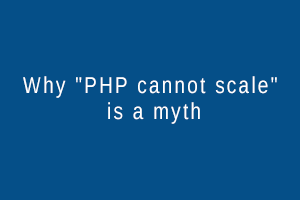While some may argue that PHP is dead, it’s far from the truth. As per W3Techs, PHP is used by 79% of all websites whose server-side programming language they know. That’s almost 4 out of 5 websites! So, it is much alive, faster, and better than it has ever been.
-
PHP usually isn’t the bottleneck
Most slow Websites have nothing to do with the language they’re using. A lot of the time is spent on an HTTP request coming down to network latency, absent or ineffectual caching of static resources, lack of compression resulting in more bandwidth used than necessary, poorly performing Javascript, etc. Several times the bottleneck is in the database as the queries are heavy and slow. Also, images and files being processed can be heavy and consuming a lot of memory.
-
It is actually getting faster
PHP 8.0 is proving to be 18.47% faster than 7.4. And if you compare it to PHP 7.0, it can handle 50% more requests (or transactions) per second.
-
PHP in the web is also faster
Through repeated testing, it has been observed that a PHP application that runs on Linux OS has chances of performing better than an ASP.Net application that is hosted on a Windows OS.
-
Perform even faster with opcode caching (eg APC)
By caching the compiled operation codes (opcodes) of PHP scripts performance can be increased manyfold. APC and OPcache enable sites to serve page content significantly faster.
Yes, at an isolated level it is slower than C#, Java, and C/C++ but the truth is in the actual systems it won’t matter that much. You can build large-scale systems on its frameworks. In fact, 4 of the top 20 visited Websites are powered by PHP (Facebook, Yahoo, Wikipedia, Flickr to name a few). PHP with an opcode cache (eg APC) can take you much further than you’ll probably need or care about.
People having good command over the French language can get a French Certification Exams from StudySection. StudySection offers both beginner level and expert level French certification exams to test the ability to communicate in the French language.




